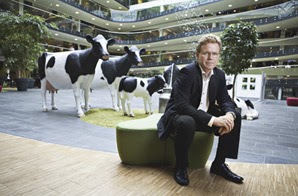Peder Tuborgh, CEO of Arla foods provides proof that the co-operative model is alive and going global.
In the wake of the financial crisis and occasionally over-excitable examination of the nature of capitalism, co-operatives have been increasingly talked about. They are the alternative model, but one viewed by most as so alternative as not to be worth exploring.
For those who doubt the robustness and contemporary usefulness of co-ops in a global business world, a visit to the dairy farms of Denmark, Sweden, the UK and Germany might be fruitful. Here they would find that the co-operative cream really does rise to the top. The co-operative model is often used in the dairy industry.
In fact, 70 per cent of the major dairy companies in Europe are co-ops. More than 12,000 dairy farms in Europe are members of the Arla Foods co-operative. Arla is best known for its biggest brands — Lurpak, Arla and Castello. It is a large global business — investing in recent years in Russia, China, the Middle East and Africa — and has been run as a co-operative since its inception in Denmark in the late nineteenth century. It produced 10.4 billion kilograms of milk in 2012, has more than 18,000 employees and its 2012 turnover was some 63,114 billion Danish kroner (£7.2 billion).
